Travel and Tourism Sector Report: UK Economic Impact Analysis
VerifiedAdded on 2019/12/04
|12
|4354
|165
Report
AI Summary
This report provides a detailed analysis of the travel and tourism sector, focusing on the United Kingdom. It begins with an introduction highlighting the importance of travel and tourism, followed by an examination of the sector's historical developments, including key government initiatives and technological advancements. The report then outlines the structure of the sector, encompassing visitor attractions, travel services, and accommodation. Task 2 delves into the roles of government, sponsored bodies, and international agencies, and analyzes the impact of local and national economic policies, such as taxes, duties, and interest rates, on the success of the tourism sector. Furthermore, it describes the importance of political changes in various countries, including the UK and India. Task 3 explores factors affecting tourism demand, such as demographics and technology, and how supply has adapted to meet these demands. Finally, Task 4 assesses the economic, environmental, and social impacts of tourism, both positive and negative, and proposes strategies to mitigate negative effects while maximizing positive ones. The report concludes with a summary of the key findings and a list of references.
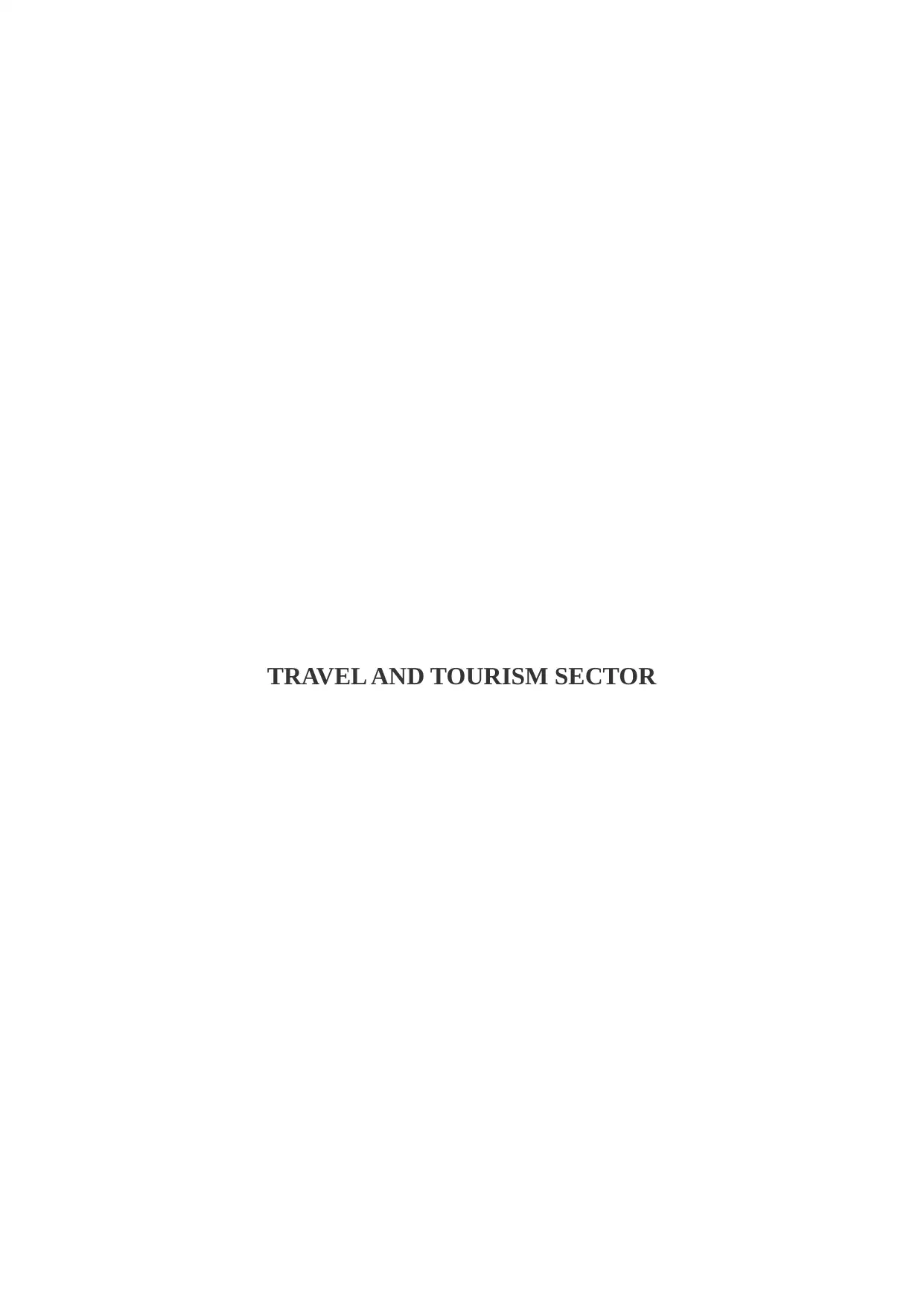
TRAVEL AND TOURISM SECTOR
Paraphrase This Document
Need a fresh take? Get an instant paraphrase of this document with our AI Paraphraser
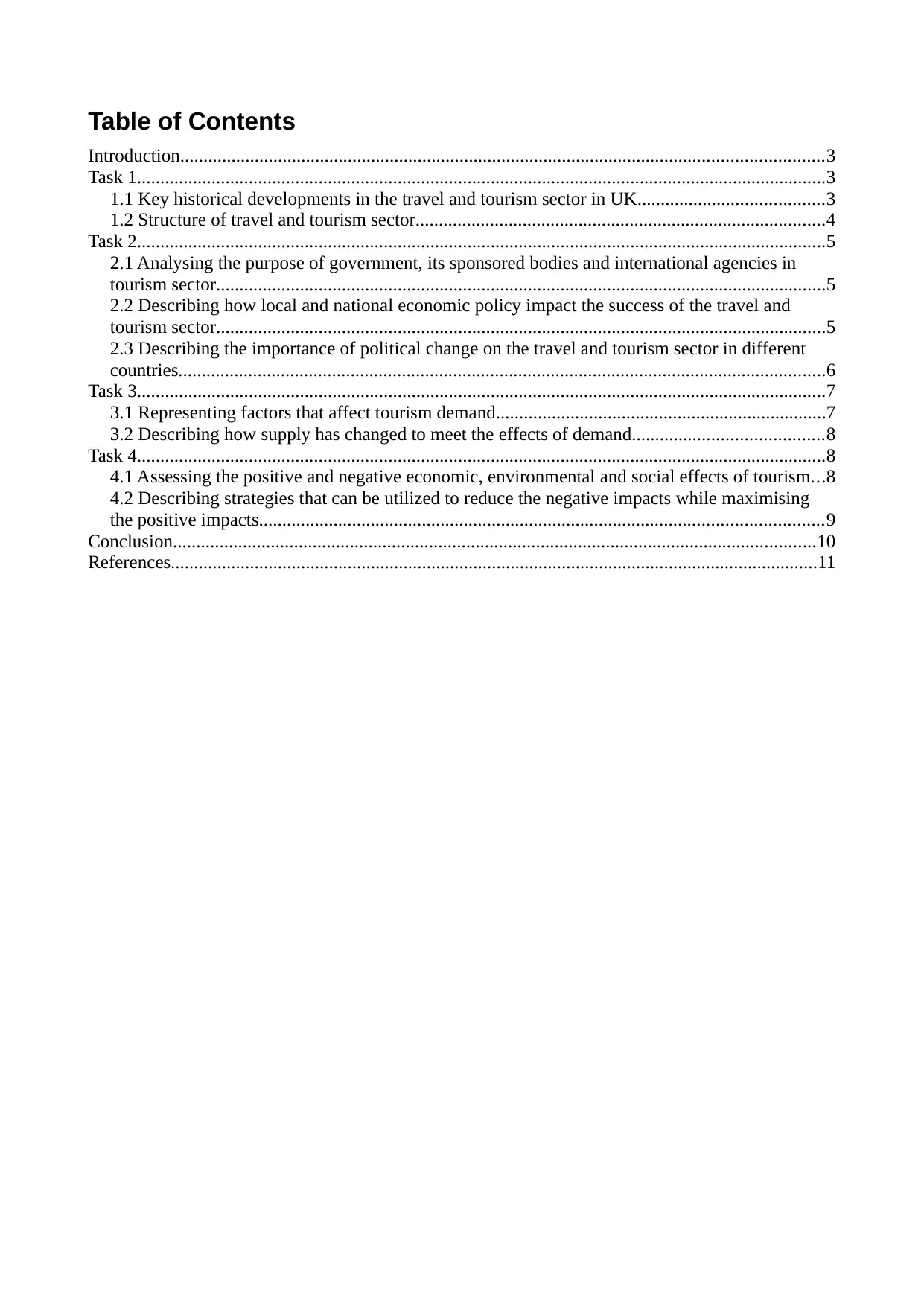
Table of Contents
Introduction..........................................................................................................................................3
Task 1....................................................................................................................................................3
1.1 Key historical developments in the travel and tourism sector in UK........................................3
1.2 Structure of travel and tourism sector........................................................................................4
Task 2....................................................................................................................................................5
2.1 Analysing the purpose of government, its sponsored bodies and international agencies in
tourism sector...................................................................................................................................5
2.2 Describing how local and national economic policy impact the success of the travel and
tourism sector...................................................................................................................................5
2.3 Describing the importance of political change on the travel and tourism sector in different
countries...........................................................................................................................................6
Task 3....................................................................................................................................................7
3.1 Representing factors that affect tourism demand.......................................................................7
3.2 Describing how supply has changed to meet the effects of demand.........................................8
Task 4....................................................................................................................................................8
4.1 Assessing the positive and negative economic, environmental and social effects of tourism...8
4.2 Describing strategies that can be utilized to reduce the negative impacts while maximising
the positive impacts.........................................................................................................................9
Conclusion..........................................................................................................................................10
References...........................................................................................................................................11
Introduction..........................................................................................................................................3
Task 1....................................................................................................................................................3
1.1 Key historical developments in the travel and tourism sector in UK........................................3
1.2 Structure of travel and tourism sector........................................................................................4
Task 2....................................................................................................................................................5
2.1 Analysing the purpose of government, its sponsored bodies and international agencies in
tourism sector...................................................................................................................................5
2.2 Describing how local and national economic policy impact the success of the travel and
tourism sector...................................................................................................................................5
2.3 Describing the importance of political change on the travel and tourism sector in different
countries...........................................................................................................................................6
Task 3....................................................................................................................................................7
3.1 Representing factors that affect tourism demand.......................................................................7
3.2 Describing how supply has changed to meet the effects of demand.........................................8
Task 4....................................................................................................................................................8
4.1 Assessing the positive and negative economic, environmental and social effects of tourism...8
4.2 Describing strategies that can be utilized to reduce the negative impacts while maximising
the positive impacts.........................................................................................................................9
Conclusion..........................................................................................................................................10
References...........................................................................................................................................11
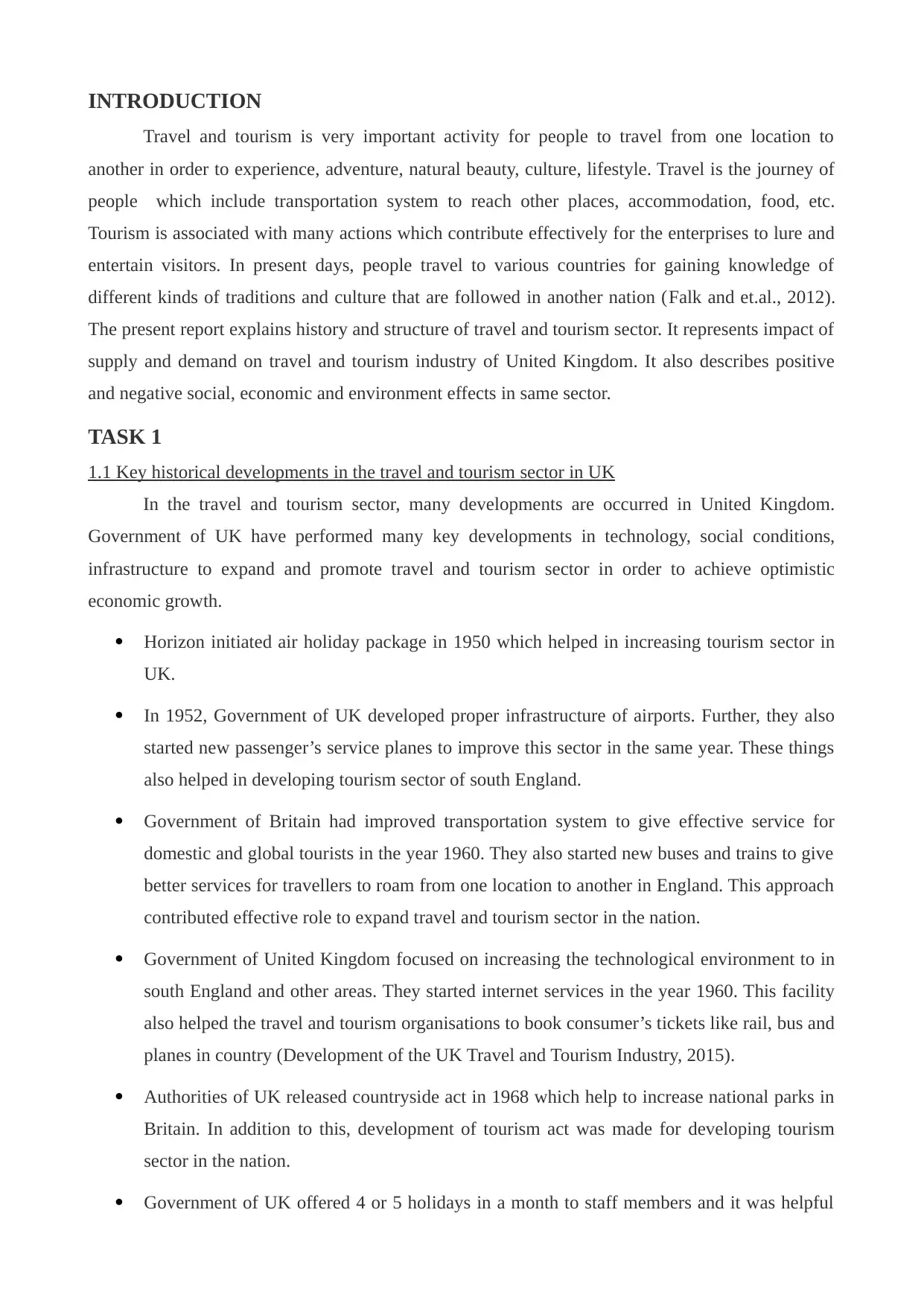
INTRODUCTION
Travel and tourism is very important activity for people to travel from one location to
another in order to experience, adventure, natural beauty, culture, lifestyle. Travel is the journey of
people which include transportation system to reach other places, accommodation, food, etc.
Tourism is associated with many actions which contribute effectively for the enterprises to lure and
entertain visitors. In present days, people travel to various countries for gaining knowledge of
different kinds of traditions and culture that are followed in another nation (Falk and et.al., 2012).
The present report explains history and structure of travel and tourism sector. It represents impact of
supply and demand on travel and tourism industry of United Kingdom. It also describes positive
and negative social, economic and environment effects in same sector.
TASK 1
1.1 Key historical developments in the travel and tourism sector in UK
In the travel and tourism sector, many developments are occurred in United Kingdom.
Government of UK have performed many key developments in technology, social conditions,
infrastructure to expand and promote travel and tourism sector in order to achieve optimistic
economic growth.
Horizon initiated air holiday package in 1950 which helped in increasing tourism sector in
UK.
In 1952, Government of UK developed proper infrastructure of airports. Further, they also
started new passenger’s service planes to improve this sector in the same year. These things
also helped in developing tourism sector of south England.
Government of Britain had improved transportation system to give effective service for
domestic and global tourists in the year 1960. They also started new buses and trains to give
better services for travellers to roam from one location to another in England. This approach
contributed effective role to expand travel and tourism sector in the nation.
Government of United Kingdom focused on increasing the technological environment to in
south England and other areas. They started internet services in the year 1960. This facility
also helped the travel and tourism organisations to book consumer’s tickets like rail, bus and
planes in country (Development of the UK Travel and Tourism Industry, 2015).
Authorities of UK released countryside act in 1968 which help to increase national parks in
Britain. In addition to this, development of tourism act was made for developing tourism
sector in the nation.
Government of UK offered 4 or 5 holidays in a month to staff members and it was helpful
Travel and tourism is very important activity for people to travel from one location to
another in order to experience, adventure, natural beauty, culture, lifestyle. Travel is the journey of
people which include transportation system to reach other places, accommodation, food, etc.
Tourism is associated with many actions which contribute effectively for the enterprises to lure and
entertain visitors. In present days, people travel to various countries for gaining knowledge of
different kinds of traditions and culture that are followed in another nation (Falk and et.al., 2012).
The present report explains history and structure of travel and tourism sector. It represents impact of
supply and demand on travel and tourism industry of United Kingdom. It also describes positive
and negative social, economic and environment effects in same sector.
TASK 1
1.1 Key historical developments in the travel and tourism sector in UK
In the travel and tourism sector, many developments are occurred in United Kingdom.
Government of UK have performed many key developments in technology, social conditions,
infrastructure to expand and promote travel and tourism sector in order to achieve optimistic
economic growth.
Horizon initiated air holiday package in 1950 which helped in increasing tourism sector in
UK.
In 1952, Government of UK developed proper infrastructure of airports. Further, they also
started new passenger’s service planes to improve this sector in the same year. These things
also helped in developing tourism sector of south England.
Government of Britain had improved transportation system to give effective service for
domestic and global tourists in the year 1960. They also started new buses and trains to give
better services for travellers to roam from one location to another in England. This approach
contributed effective role to expand travel and tourism sector in the nation.
Government of United Kingdom focused on increasing the technological environment to in
south England and other areas. They started internet services in the year 1960. This facility
also helped the travel and tourism organisations to book consumer’s tickets like rail, bus and
planes in country (Development of the UK Travel and Tourism Industry, 2015).
Authorities of UK released countryside act in 1968 which help to increase national parks in
Britain. In addition to this, development of tourism act was made for developing tourism
sector in the nation.
Government of UK offered 4 or 5 holidays in a month to staff members and it was helpful
⊘ This is a preview!⊘
Do you want full access?
Subscribe today to unlock all pages.

Trusted by 1+ million students worldwide
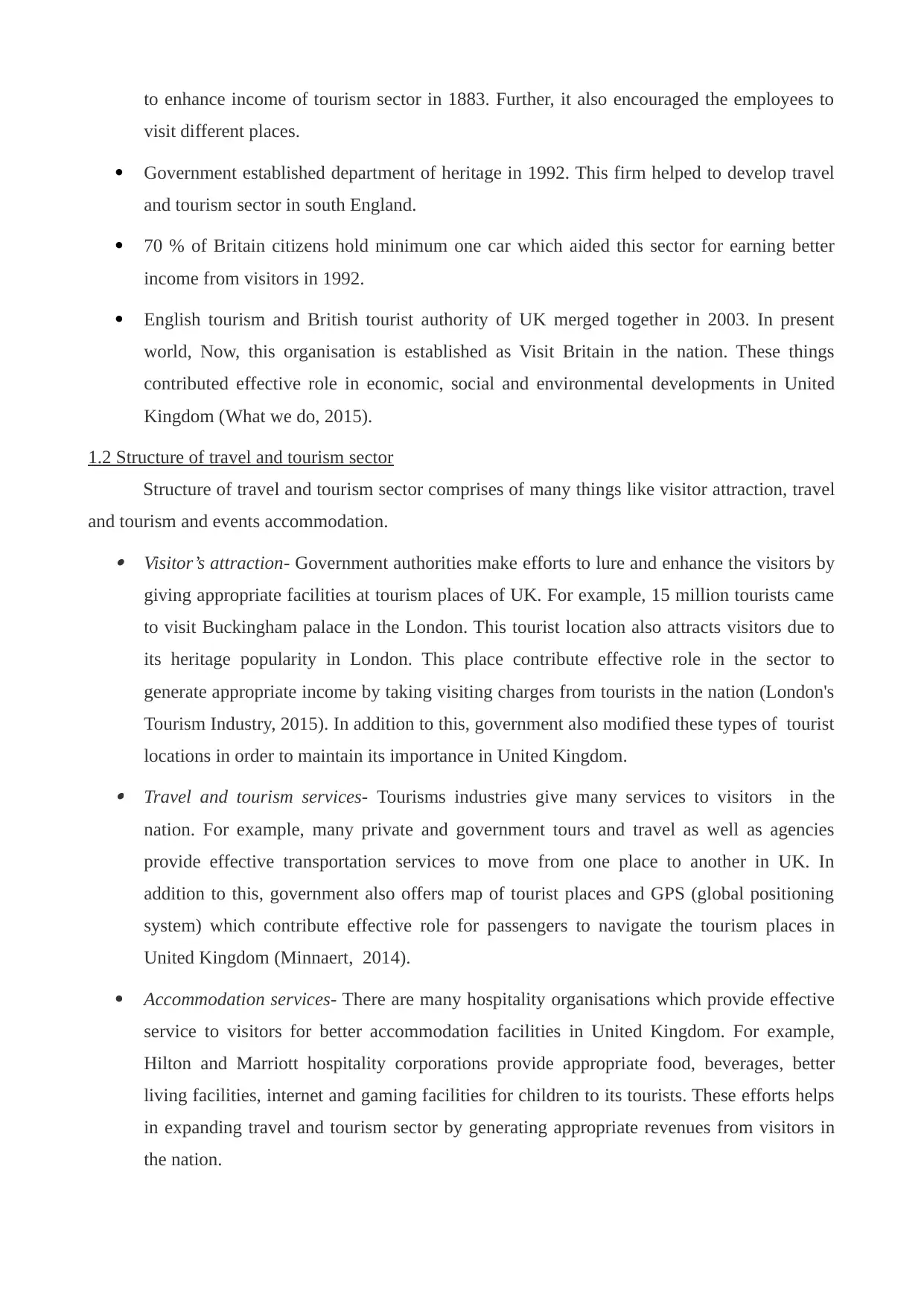
to enhance income of tourism sector in 1883. Further, it also encouraged the employees to
visit different places.
Government established department of heritage in 1992. This firm helped to develop travel
and tourism sector in south England.
70 % of Britain citizens hold minimum one car which aided this sector for earning better
income from visitors in 1992.
English tourism and British tourist authority of UK merged together in 2003. In present
world, Now, this organisation is established as Visit Britain in the nation. These things
contributed effective role in economic, social and environmental developments in United
Kingdom (What we do, 2015).
1.2 Structure of travel and tourism sector
Structure of travel and tourism sector comprises of many things like visitor attraction, travel
and tourism and events accommodation.
Visitor’s attraction- Government authorities make efforts to lure and enhance the visitors by
giving appropriate facilities at tourism places of UK. For example, 15 million tourists came
to visit Buckingham palace in the London. This tourist location also attracts visitors due to
its heritage popularity in London. This place contribute effective role in the sector to
generate appropriate income by taking visiting charges from tourists in the nation (London's
Tourism Industry, 2015). In addition to this, government also modified these types of tourist
locations in order to maintain its importance in United Kingdom.
Travel and tourism services- Tourisms industries give many services to visitors in the
nation. For example, many private and government tours and travel as well as agencies
provide effective transportation services to move from one place to another in UK. In
addition to this, government also offers map of tourist places and GPS (global positioning
system) which contribute effective role for passengers to navigate the tourism places in
United Kingdom (Minnaert, 2014).
Accommodation services- There are many hospitality organisations which provide effective
service to visitors for better accommodation facilities in United Kingdom. For example,
Hilton and Marriott hospitality corporations provide appropriate food, beverages, better
living facilities, internet and gaming facilities for children to its tourists. These efforts helps
in expanding travel and tourism sector by generating appropriate revenues from visitors in
the nation.
visit different places.
Government established department of heritage in 1992. This firm helped to develop travel
and tourism sector in south England.
70 % of Britain citizens hold minimum one car which aided this sector for earning better
income from visitors in 1992.
English tourism and British tourist authority of UK merged together in 2003. In present
world, Now, this organisation is established as Visit Britain in the nation. These things
contributed effective role in economic, social and environmental developments in United
Kingdom (What we do, 2015).
1.2 Structure of travel and tourism sector
Structure of travel and tourism sector comprises of many things like visitor attraction, travel
and tourism and events accommodation.
Visitor’s attraction- Government authorities make efforts to lure and enhance the visitors by
giving appropriate facilities at tourism places of UK. For example, 15 million tourists came
to visit Buckingham palace in the London. This tourist location also attracts visitors due to
its heritage popularity in London. This place contribute effective role in the sector to
generate appropriate income by taking visiting charges from tourists in the nation (London's
Tourism Industry, 2015). In addition to this, government also modified these types of tourist
locations in order to maintain its importance in United Kingdom.
Travel and tourism services- Tourisms industries give many services to visitors in the
nation. For example, many private and government tours and travel as well as agencies
provide effective transportation services to move from one place to another in UK. In
addition to this, government also offers map of tourist places and GPS (global positioning
system) which contribute effective role for passengers to navigate the tourism places in
United Kingdom (Minnaert, 2014).
Accommodation services- There are many hospitality organisations which provide effective
service to visitors for better accommodation facilities in United Kingdom. For example,
Hilton and Marriott hospitality corporations provide appropriate food, beverages, better
living facilities, internet and gaming facilities for children to its tourists. These efforts helps
in expanding travel and tourism sector by generating appropriate revenues from visitors in
the nation.
Paraphrase This Document
Need a fresh take? Get an instant paraphrase of this document with our AI Paraphraser
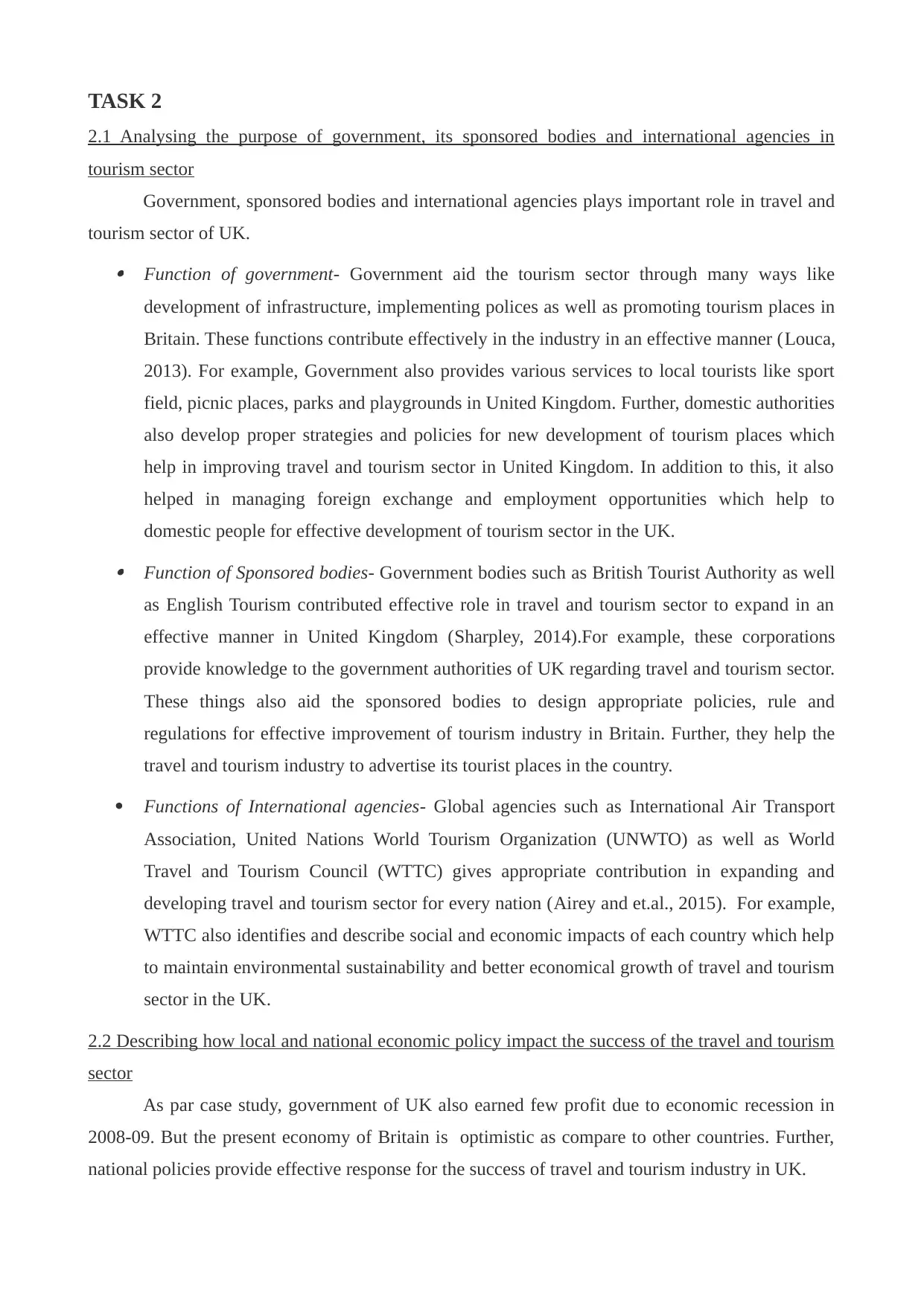
TASK 2
2.1 Analysing the purpose of government, its sponsored bodies and international agencies in
tourism sector
Government, sponsored bodies and international agencies plays important role in travel and
tourism sector of UK.
Function of government- Government aid the tourism sector through many ways like
development of infrastructure, implementing polices as well as promoting tourism places in
Britain. These functions contribute effectively in the industry in an effective manner (Louca,
2013). For example, Government also provides various services to local tourists like sport
field, picnic places, parks and playgrounds in United Kingdom. Further, domestic authorities
also develop proper strategies and policies for new development of tourism places which
help in improving travel and tourism sector in United Kingdom. In addition to this, it also
helped in managing foreign exchange and employment opportunities which help to
domestic people for effective development of tourism sector in the UK.
Function of Sponsored bodies- Government bodies such as British Tourist Authority as well
as English Tourism contributed effective role in travel and tourism sector to expand in an
effective manner in United Kingdom (Sharpley, 2014).For example, these corporations
provide knowledge to the government authorities of UK regarding travel and tourism sector.
These things also aid the sponsored bodies to design appropriate policies, rule and
regulations for effective improvement of tourism industry in Britain. Further, they help the
travel and tourism industry to advertise its tourist places in the country.
Functions of International agencies- Global agencies such as International Air Transport
Association, United Nations World Tourism Organization (UNWTO) as well as World
Travel and Tourism Council (WTTC) gives appropriate contribution in expanding and
developing travel and tourism sector for every nation (Airey and et.al., 2015). For example,
WTTC also identifies and describe social and economic impacts of each country which help
to maintain environmental sustainability and better economical growth of travel and tourism
sector in the UK.
2.2 Describing how local and national economic policy impact the success of the travel and tourism
sector
As par case study, government of UK also earned few profit due to economic recession in
2008-09. But the present economy of Britain is optimistic as compare to other countries. Further,
national policies provide effective response for the success of travel and tourism industry in UK.
2.1 Analysing the purpose of government, its sponsored bodies and international agencies in
tourism sector
Government, sponsored bodies and international agencies plays important role in travel and
tourism sector of UK.
Function of government- Government aid the tourism sector through many ways like
development of infrastructure, implementing polices as well as promoting tourism places in
Britain. These functions contribute effectively in the industry in an effective manner (Louca,
2013). For example, Government also provides various services to local tourists like sport
field, picnic places, parks and playgrounds in United Kingdom. Further, domestic authorities
also develop proper strategies and policies for new development of tourism places which
help in improving travel and tourism sector in United Kingdom. In addition to this, it also
helped in managing foreign exchange and employment opportunities which help to
domestic people for effective development of tourism sector in the UK.
Function of Sponsored bodies- Government bodies such as British Tourist Authority as well
as English Tourism contributed effective role in travel and tourism sector to expand in an
effective manner in United Kingdom (Sharpley, 2014).For example, these corporations
provide knowledge to the government authorities of UK regarding travel and tourism sector.
These things also aid the sponsored bodies to design appropriate policies, rule and
regulations for effective improvement of tourism industry in Britain. Further, they help the
travel and tourism industry to advertise its tourist places in the country.
Functions of International agencies- Global agencies such as International Air Transport
Association, United Nations World Tourism Organization (UNWTO) as well as World
Travel and Tourism Council (WTTC) gives appropriate contribution in expanding and
developing travel and tourism sector for every nation (Airey and et.al., 2015). For example,
WTTC also identifies and describe social and economic impacts of each country which help
to maintain environmental sustainability and better economical growth of travel and tourism
sector in the UK.
2.2 Describing how local and national economic policy impact the success of the travel and tourism
sector
As par case study, government of UK also earned few profit due to economic recession in
2008-09. But the present economy of Britain is optimistic as compare to other countries. Further,
national policies provide effective response for the success of travel and tourism industry in UK.
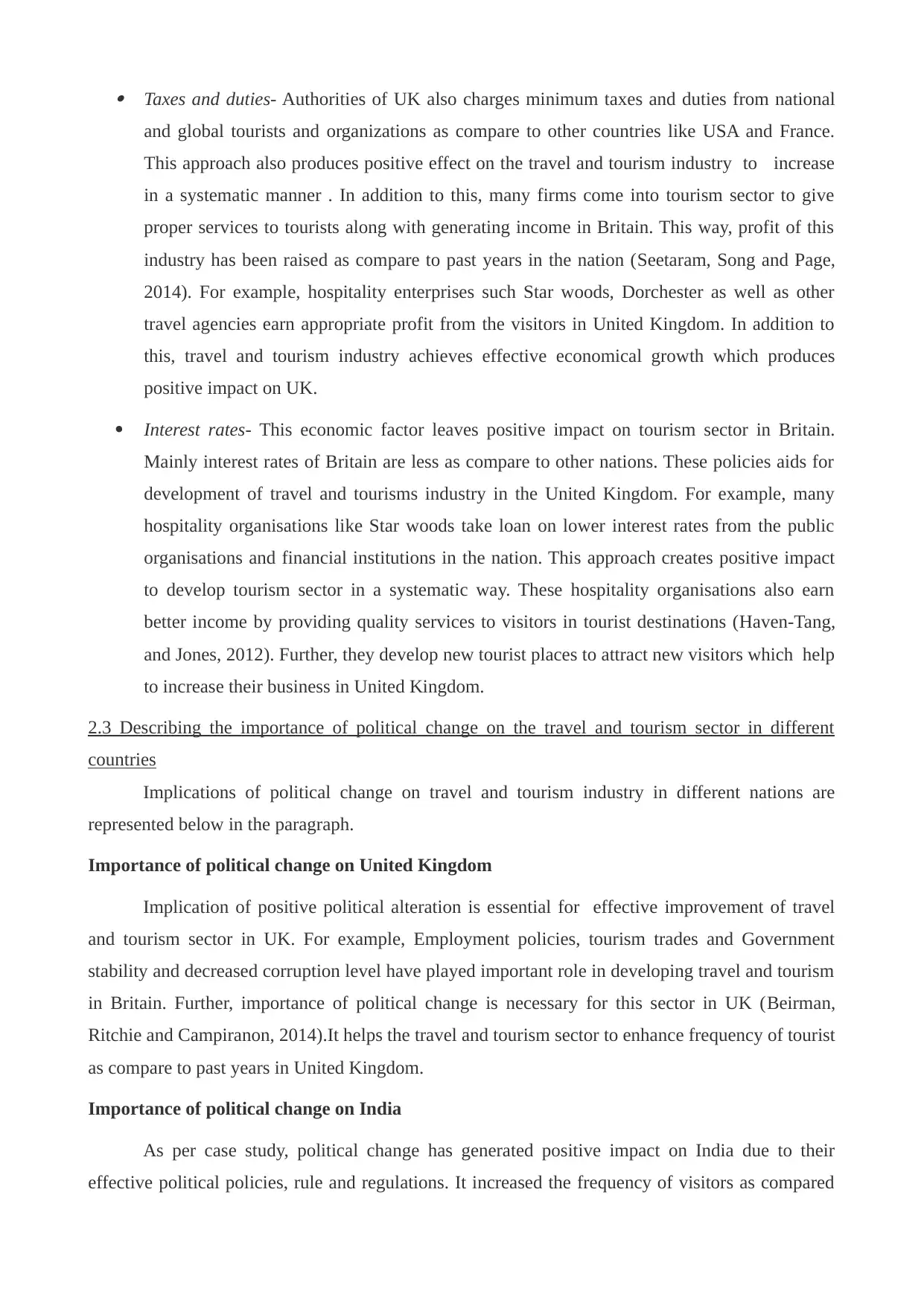
Taxes and duties- Authorities of UK also charges minimum taxes and duties from national
and global tourists and organizations as compare to other countries like USA and France.
This approach also produces positive effect on the travel and tourism industry to increase
in a systematic manner . In addition to this, many firms come into tourism sector to give
proper services to tourists along with generating income in Britain. This way, profit of this
industry has been raised as compare to past years in the nation (Seetaram, Song and Page,
2014). For example, hospitality enterprises such Star woods, Dorchester as well as other
travel agencies earn appropriate profit from the visitors in United Kingdom. In addition to
this, travel and tourism industry achieves effective economical growth which produces
positive impact on UK.
Interest rates- This economic factor leaves positive impact on tourism sector in Britain.
Mainly interest rates of Britain are less as compare to other nations. These policies aids for
development of travel and tourisms industry in the United Kingdom. For example, many
hospitality organisations like Star woods take loan on lower interest rates from the public
organisations and financial institutions in the nation. This approach creates positive impact
to develop tourism sector in a systematic way. These hospitality organisations also earn
better income by providing quality services to visitors in tourist destinations (Haven‐Tang,
and Jones, 2012). Further, they develop new tourist places to attract new visitors which help
to increase their business in United Kingdom.
2.3 Describing the importance of political change on the travel and tourism sector in different
countries
Implications of political change on travel and tourism industry in different nations are
represented below in the paragraph.
Importance of political change on United Kingdom
Implication of positive political alteration is essential for effective improvement of travel
and tourism sector in UK. For example, Employment policies, tourism trades and Government
stability and decreased corruption level have played important role in developing travel and tourism
in Britain. Further, importance of political change is necessary for this sector in UK (Beirman,
Ritchie and Campiranon, 2014).It helps the travel and tourism sector to enhance frequency of tourist
as compare to past years in United Kingdom.
Importance of political change on India
As per case study, political change has generated positive impact on India due to their
effective political policies, rule and regulations. It increased the frequency of visitors as compared
and global tourists and organizations as compare to other countries like USA and France.
This approach also produces positive effect on the travel and tourism industry to increase
in a systematic manner . In addition to this, many firms come into tourism sector to give
proper services to tourists along with generating income in Britain. This way, profit of this
industry has been raised as compare to past years in the nation (Seetaram, Song and Page,
2014). For example, hospitality enterprises such Star woods, Dorchester as well as other
travel agencies earn appropriate profit from the visitors in United Kingdom. In addition to
this, travel and tourism industry achieves effective economical growth which produces
positive impact on UK.
Interest rates- This economic factor leaves positive impact on tourism sector in Britain.
Mainly interest rates of Britain are less as compare to other nations. These policies aids for
development of travel and tourisms industry in the United Kingdom. For example, many
hospitality organisations like Star woods take loan on lower interest rates from the public
organisations and financial institutions in the nation. This approach creates positive impact
to develop tourism sector in a systematic way. These hospitality organisations also earn
better income by providing quality services to visitors in tourist destinations (Haven‐Tang,
and Jones, 2012). Further, they develop new tourist places to attract new visitors which help
to increase their business in United Kingdom.
2.3 Describing the importance of political change on the travel and tourism sector in different
countries
Implications of political change on travel and tourism industry in different nations are
represented below in the paragraph.
Importance of political change on United Kingdom
Implication of positive political alteration is essential for effective improvement of travel
and tourism sector in UK. For example, Employment policies, tourism trades and Government
stability and decreased corruption level have played important role in developing travel and tourism
in Britain. Further, importance of political change is necessary for this sector in UK (Beirman,
Ritchie and Campiranon, 2014).It helps the travel and tourism sector to enhance frequency of tourist
as compare to past years in United Kingdom.
Importance of political change on India
As per case study, political change has generated positive impact on India due to their
effective political policies, rule and regulations. It increased the frequency of visitors as compared
⊘ This is a preview!⊘
Do you want full access?
Subscribe today to unlock all pages.

Trusted by 1+ million students worldwide
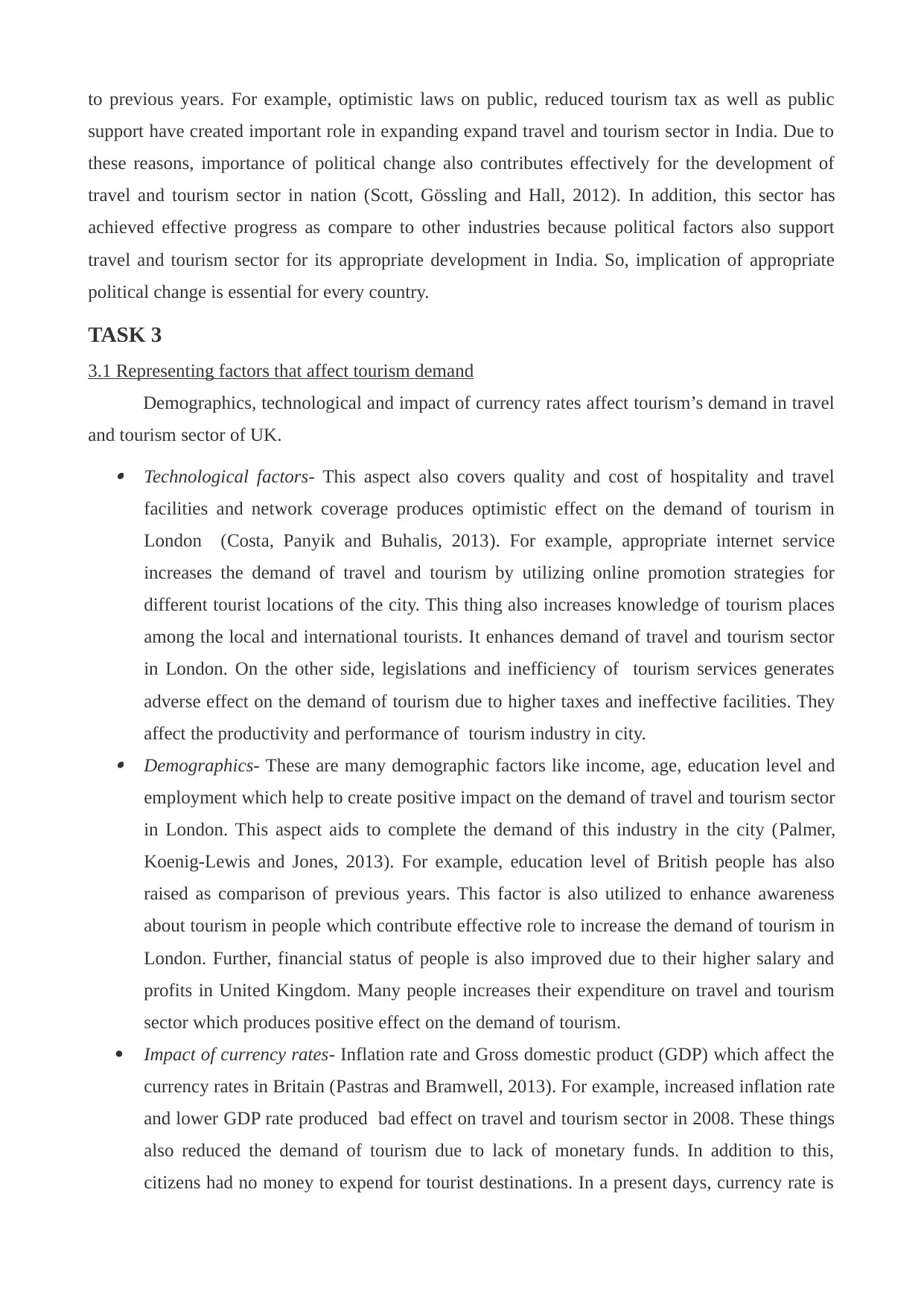
to previous years. For example, optimistic laws on public, reduced tourism tax as well as public
support have created important role in expanding expand travel and tourism sector in India. Due to
these reasons, importance of political change also contributes effectively for the development of
travel and tourism sector in nation (Scott, Gössling and Hall, 2012). In addition, this sector has
achieved effective progress as compare to other industries because political factors also support
travel and tourism sector for its appropriate development in India. So, implication of appropriate
political change is essential for every country.
TASK 3
3.1 Representing factors that affect tourism demand
Demographics, technological and impact of currency rates affect tourism’s demand in travel
and tourism sector of UK.
Technological factors- This aspect also covers quality and cost of hospitality and travel
facilities and network coverage produces optimistic effect on the demand of tourism in
London (Costa, Panyik and Buhalis, 2013). For example, appropriate internet service
increases the demand of travel and tourism by utilizing online promotion strategies for
different tourist locations of the city. This thing also increases knowledge of tourism places
among the local and international tourists. It enhances demand of travel and tourism sector
in London. On the other side, legislations and inefficiency of tourism services generates
adverse effect on the demand of tourism due to higher taxes and ineffective facilities. They
affect the productivity and performance of tourism industry in city. Demographics- These are many demographic factors like income, age, education level and
employment which help to create positive impact on the demand of travel and tourism sector
in London. This aspect aids to complete the demand of this industry in the city (Palmer,
Koenig-Lewis and Jones, 2013). For example, education level of British people has also
raised as comparison of previous years. This factor is also utilized to enhance awareness
about tourism in people which contribute effective role to increase the demand of tourism in
London. Further, financial status of people is also improved due to their higher salary and
profits in United Kingdom. Many people increases their expenditure on travel and tourism
sector which produces positive effect on the demand of tourism.
Impact of currency rates- Inflation rate and Gross domestic product (GDP) which affect the
currency rates in Britain (Pastras and Bramwell, 2013). For example, increased inflation rate
and lower GDP rate produced bad effect on travel and tourism sector in 2008. These things
also reduced the demand of tourism due to lack of monetary funds. In addition to this,
citizens had no money to expend for tourist destinations. In a present days, currency rate is
support have created important role in expanding expand travel and tourism sector in India. Due to
these reasons, importance of political change also contributes effectively for the development of
travel and tourism sector in nation (Scott, Gössling and Hall, 2012). In addition, this sector has
achieved effective progress as compare to other industries because political factors also support
travel and tourism sector for its appropriate development in India. So, implication of appropriate
political change is essential for every country.
TASK 3
3.1 Representing factors that affect tourism demand
Demographics, technological and impact of currency rates affect tourism’s demand in travel
and tourism sector of UK.
Technological factors- This aspect also covers quality and cost of hospitality and travel
facilities and network coverage produces optimistic effect on the demand of tourism in
London (Costa, Panyik and Buhalis, 2013). For example, appropriate internet service
increases the demand of travel and tourism by utilizing online promotion strategies for
different tourist locations of the city. This thing also increases knowledge of tourism places
among the local and international tourists. It enhances demand of travel and tourism sector
in London. On the other side, legislations and inefficiency of tourism services generates
adverse effect on the demand of tourism due to higher taxes and ineffective facilities. They
affect the productivity and performance of tourism industry in city. Demographics- These are many demographic factors like income, age, education level and
employment which help to create positive impact on the demand of travel and tourism sector
in London. This aspect aids to complete the demand of this industry in the city (Palmer,
Koenig-Lewis and Jones, 2013). For example, education level of British people has also
raised as comparison of previous years. This factor is also utilized to enhance awareness
about tourism in people which contribute effective role to increase the demand of tourism in
London. Further, financial status of people is also improved due to their higher salary and
profits in United Kingdom. Many people increases their expenditure on travel and tourism
sector which produces positive effect on the demand of tourism.
Impact of currency rates- Inflation rate and Gross domestic product (GDP) which affect the
currency rates in Britain (Pastras and Bramwell, 2013). For example, increased inflation rate
and lower GDP rate produced bad effect on travel and tourism sector in 2008. These things
also reduced the demand of tourism due to lack of monetary funds. In addition to this,
citizens had no money to expend for tourist destinations. In a present days, currency rate is
Paraphrase This Document
Need a fresh take? Get an instant paraphrase of this document with our AI Paraphraser
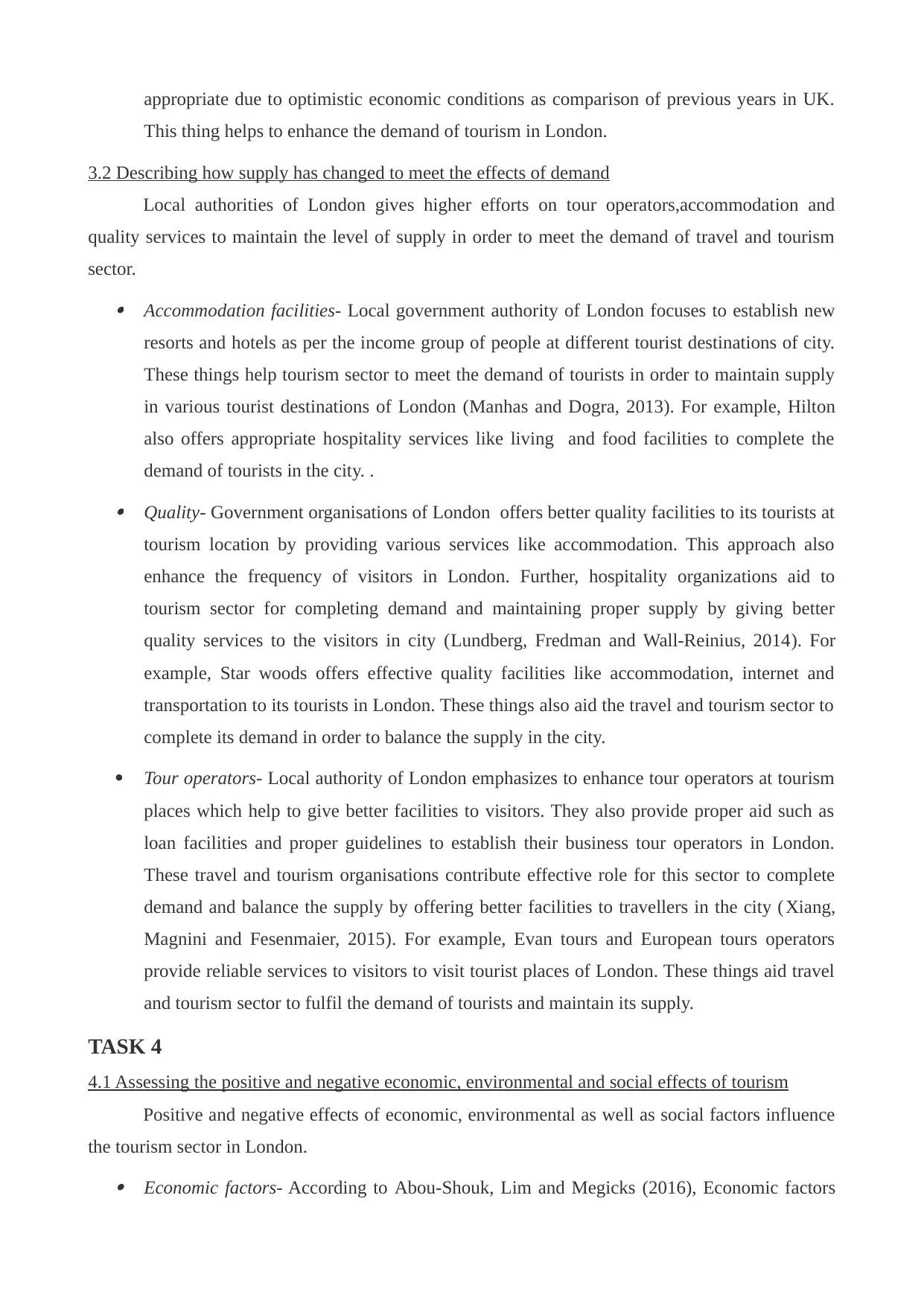
appropriate due to optimistic economic conditions as comparison of previous years in UK.
This thing helps to enhance the demand of tourism in London.
3.2 Describing how supply has changed to meet the effects of demand
Local authorities of London gives higher efforts on tour operators,accommodation and
quality services to maintain the level of supply in order to meet the demand of travel and tourism
sector.
Accommodation facilities- Local government authority of London focuses to establish new
resorts and hotels as per the income group of people at different tourist destinations of city.
These things help tourism sector to meet the demand of tourists in order to maintain supply
in various tourist destinations of London (Manhas and Dogra, 2013). For example, Hilton
also offers appropriate hospitality services like living and food facilities to complete the
demand of tourists in the city. .
Quality- Government organisations of London offers better quality facilities to its tourists at
tourism location by providing various services like accommodation. This approach also
enhance the frequency of visitors in London. Further, hospitality organizations aid to
tourism sector for completing demand and maintaining proper supply by giving better
quality services to the visitors in city (Lundberg, Fredman and Wall-Reinius, 2014). For
example, Star woods offers effective quality facilities like accommodation, internet and
transportation to its tourists in London. These things also aid the travel and tourism sector to
complete its demand in order to balance the supply in the city.
Tour operators- Local authority of London emphasizes to enhance tour operators at tourism
places which help to give better facilities to visitors. They also provide proper aid such as
loan facilities and proper guidelines to establish their business tour operators in London.
These travel and tourism organisations contribute effective role for this sector to complete
demand and balance the supply by offering better facilities to travellers in the city (Xiang,
Magnini and Fesenmaier, 2015). For example, Evan tours and European tours operators
provide reliable services to visitors to visit tourist places of London. These things aid travel
and tourism sector to fulfil the demand of tourists and maintain its supply.
TASK 4
4.1 Assessing the positive and negative economic, environmental and social effects of tourism
Positive and negative effects of economic, environmental as well as social factors influence
the tourism sector in London.
Economic factors- According to Abou-Shouk, Lim and Megicks (2016), Economic factors
This thing helps to enhance the demand of tourism in London.
3.2 Describing how supply has changed to meet the effects of demand
Local authorities of London gives higher efforts on tour operators,accommodation and
quality services to maintain the level of supply in order to meet the demand of travel and tourism
sector.
Accommodation facilities- Local government authority of London focuses to establish new
resorts and hotels as per the income group of people at different tourist destinations of city.
These things help tourism sector to meet the demand of tourists in order to maintain supply
in various tourist destinations of London (Manhas and Dogra, 2013). For example, Hilton
also offers appropriate hospitality services like living and food facilities to complete the
demand of tourists in the city. .
Quality- Government organisations of London offers better quality facilities to its tourists at
tourism location by providing various services like accommodation. This approach also
enhance the frequency of visitors in London. Further, hospitality organizations aid to
tourism sector for completing demand and maintaining proper supply by giving better
quality services to the visitors in city (Lundberg, Fredman and Wall-Reinius, 2014). For
example, Star woods offers effective quality facilities like accommodation, internet and
transportation to its tourists in London. These things also aid the travel and tourism sector to
complete its demand in order to balance the supply in the city.
Tour operators- Local authority of London emphasizes to enhance tour operators at tourism
places which help to give better facilities to visitors. They also provide proper aid such as
loan facilities and proper guidelines to establish their business tour operators in London.
These travel and tourism organisations contribute effective role for this sector to complete
demand and balance the supply by offering better facilities to travellers in the city (Xiang,
Magnini and Fesenmaier, 2015). For example, Evan tours and European tours operators
provide reliable services to visitors to visit tourist places of London. These things aid travel
and tourism sector to fulfil the demand of tourists and maintain its supply.
TASK 4
4.1 Assessing the positive and negative economic, environmental and social effects of tourism
Positive and negative effects of economic, environmental as well as social factors influence
the tourism sector in London.
Economic factors- According to Abou-Shouk, Lim and Megicks (2016), Economic factors
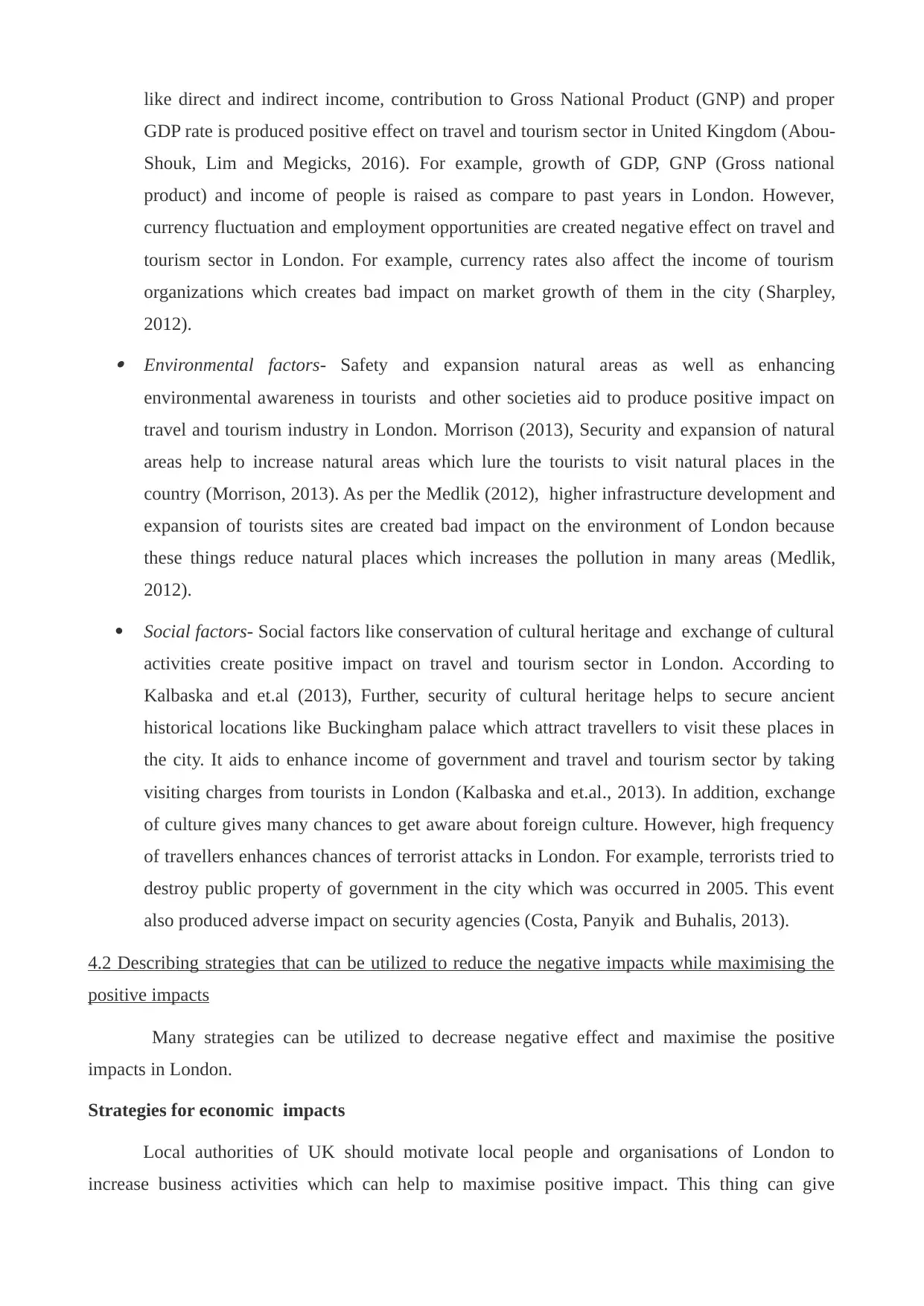
like direct and indirect income, contribution to Gross National Product (GNP) and proper
GDP rate is produced positive effect on travel and tourism sector in United Kingdom (Abou-
Shouk, Lim and Megicks, 2016). For example, growth of GDP, GNP (Gross national
product) and income of people is raised as compare to past years in London. However,
currency fluctuation and employment opportunities are created negative effect on travel and
tourism sector in London. For example, currency rates also affect the income of tourism
organizations which creates bad impact on market growth of them in the city (Sharpley,
2012).
Environmental factors- Safety and expansion natural areas as well as enhancing
environmental awareness in tourists and other societies aid to produce positive impact on
travel and tourism industry in London. Morrison (2013), Security and expansion of natural
areas help to increase natural areas which lure the tourists to visit natural places in the
country (Morrison, 2013). As per the Medlik (2012), higher infrastructure development and
expansion of tourists sites are created bad impact on the environment of London because
these things reduce natural places which increases the pollution in many areas (Medlik,
2012).
Social factors- Social factors like conservation of cultural heritage and exchange of cultural
activities create positive impact on travel and tourism sector in London. According to
Kalbaska and et.al (2013), Further, security of cultural heritage helps to secure ancient
historical locations like Buckingham palace which attract travellers to visit these places in
the city. It aids to enhance income of government and travel and tourism sector by taking
visiting charges from tourists in London (Kalbaska and et.al., 2013). In addition, exchange
of culture gives many chances to get aware about foreign culture. However, high frequency
of travellers enhances chances of terrorist attacks in London. For example, terrorists tried to
destroy public property of government in the city which was occurred in 2005. This event
also produced adverse impact on security agencies (Costa, Panyik and Buhalis, 2013).
4.2 Describing strategies that can be utilized to reduce the negative impacts while maximising the
positive impacts
Many strategies can be utilized to decrease negative effect and maximise the positive
impacts in London.
Strategies for economic impacts
Local authorities of UK should motivate local people and organisations of London to
increase business activities which can help to maximise positive impact. This thing can give
GDP rate is produced positive effect on travel and tourism sector in United Kingdom (Abou-
Shouk, Lim and Megicks, 2016). For example, growth of GDP, GNP (Gross national
product) and income of people is raised as compare to past years in London. However,
currency fluctuation and employment opportunities are created negative effect on travel and
tourism sector in London. For example, currency rates also affect the income of tourism
organizations which creates bad impact on market growth of them in the city (Sharpley,
2012).
Environmental factors- Safety and expansion natural areas as well as enhancing
environmental awareness in tourists and other societies aid to produce positive impact on
travel and tourism industry in London. Morrison (2013), Security and expansion of natural
areas help to increase natural areas which lure the tourists to visit natural places in the
country (Morrison, 2013). As per the Medlik (2012), higher infrastructure development and
expansion of tourists sites are created bad impact on the environment of London because
these things reduce natural places which increases the pollution in many areas (Medlik,
2012).
Social factors- Social factors like conservation of cultural heritage and exchange of cultural
activities create positive impact on travel and tourism sector in London. According to
Kalbaska and et.al (2013), Further, security of cultural heritage helps to secure ancient
historical locations like Buckingham palace which attract travellers to visit these places in
the city. It aids to enhance income of government and travel and tourism sector by taking
visiting charges from tourists in London (Kalbaska and et.al., 2013). In addition, exchange
of culture gives many chances to get aware about foreign culture. However, high frequency
of travellers enhances chances of terrorist attacks in London. For example, terrorists tried to
destroy public property of government in the city which was occurred in 2005. This event
also produced adverse impact on security agencies (Costa, Panyik and Buhalis, 2013).
4.2 Describing strategies that can be utilized to reduce the negative impacts while maximising the
positive impacts
Many strategies can be utilized to decrease negative effect and maximise the positive
impacts in London.
Strategies for economic impacts
Local authorities of UK should motivate local people and organisations of London to
increase business activities which can help to maximise positive impact. This thing can give
⊘ This is a preview!⊘
Do you want full access?
Subscribe today to unlock all pages.

Trusted by 1+ million students worldwide
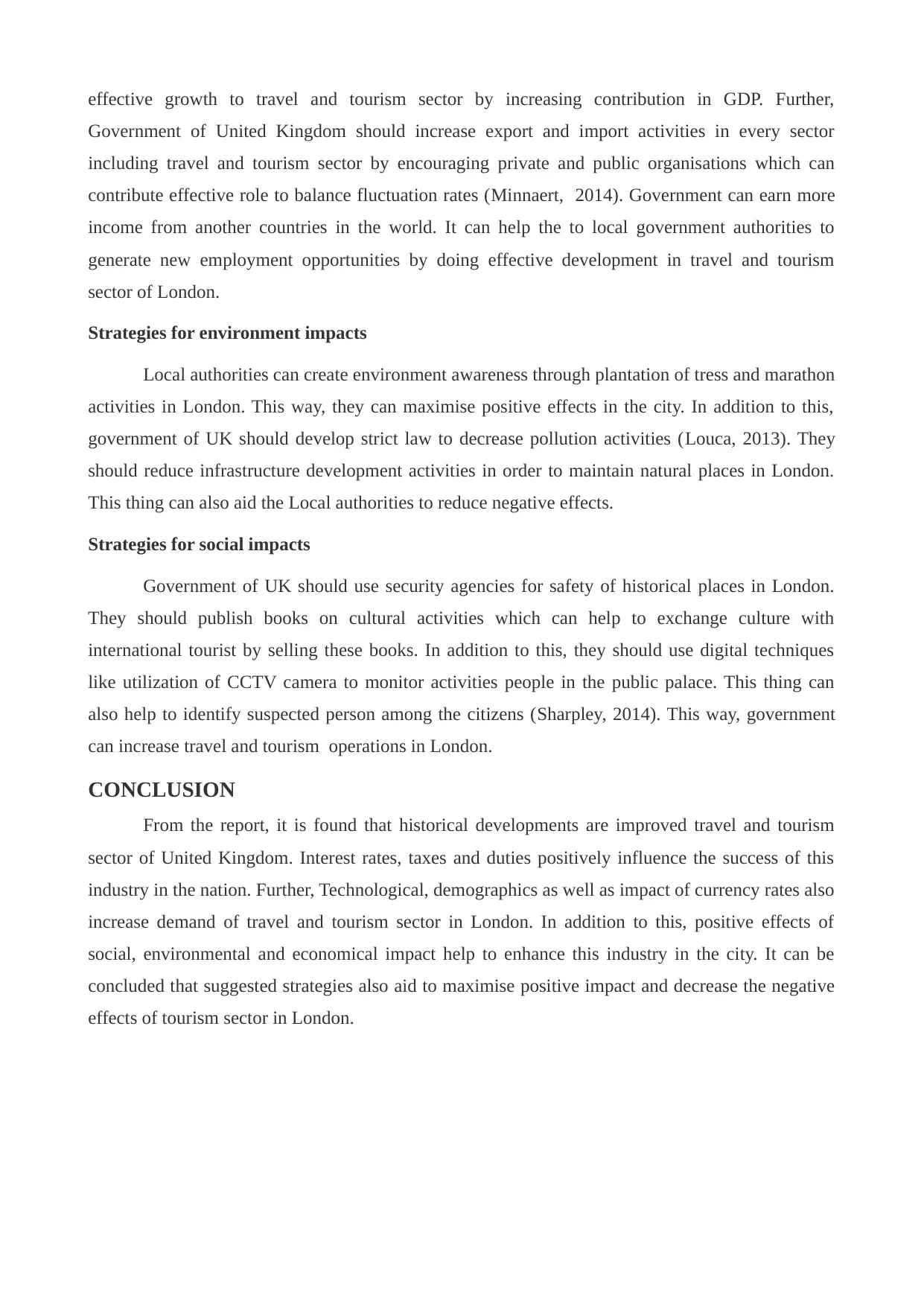
effective growth to travel and tourism sector by increasing contribution in GDP. Further,
Government of United Kingdom should increase export and import activities in every sector
including travel and tourism sector by encouraging private and public organisations which can
contribute effective role to balance fluctuation rates (Minnaert, 2014). Government can earn more
income from another countries in the world. It can help the to local government authorities to
generate new employment opportunities by doing effective development in travel and tourism
sector of London.
Strategies for environment impacts
Local authorities can create environment awareness through plantation of tress and marathon
activities in London. This way, they can maximise positive effects in the city. In addition to this,
government of UK should develop strict law to decrease pollution activities (Louca, 2013). They
should reduce infrastructure development activities in order to maintain natural places in London.
This thing can also aid the Local authorities to reduce negative effects.
Strategies for social impacts
Government of UK should use security agencies for safety of historical places in London.
They should publish books on cultural activities which can help to exchange culture with
international tourist by selling these books. In addition to this, they should use digital techniques
like utilization of CCTV camera to monitor activities people in the public palace. This thing can
also help to identify suspected person among the citizens (Sharpley, 2014). This way, government
can increase travel and tourism operations in London.
CONCLUSION
From the report, it is found that historical developments are improved travel and tourism
sector of United Kingdom. Interest rates, taxes and duties positively influence the success of this
industry in the nation. Further, Technological, demographics as well as impact of currency rates also
increase demand of travel and tourism sector in London. In addition to this, positive effects of
social, environmental and economical impact help to enhance this industry in the city. It can be
concluded that suggested strategies also aid to maximise positive impact and decrease the negative
effects of tourism sector in London.
Government of United Kingdom should increase export and import activities in every sector
including travel and tourism sector by encouraging private and public organisations which can
contribute effective role to balance fluctuation rates (Minnaert, 2014). Government can earn more
income from another countries in the world. It can help the to local government authorities to
generate new employment opportunities by doing effective development in travel and tourism
sector of London.
Strategies for environment impacts
Local authorities can create environment awareness through plantation of tress and marathon
activities in London. This way, they can maximise positive effects in the city. In addition to this,
government of UK should develop strict law to decrease pollution activities (Louca, 2013). They
should reduce infrastructure development activities in order to maintain natural places in London.
This thing can also aid the Local authorities to reduce negative effects.
Strategies for social impacts
Government of UK should use security agencies for safety of historical places in London.
They should publish books on cultural activities which can help to exchange culture with
international tourist by selling these books. In addition to this, they should use digital techniques
like utilization of CCTV camera to monitor activities people in the public palace. This thing can
also help to identify suspected person among the citizens (Sharpley, 2014). This way, government
can increase travel and tourism operations in London.
CONCLUSION
From the report, it is found that historical developments are improved travel and tourism
sector of United Kingdom. Interest rates, taxes and duties positively influence the success of this
industry in the nation. Further, Technological, demographics as well as impact of currency rates also
increase demand of travel and tourism sector in London. In addition to this, positive effects of
social, environmental and economical impact help to enhance this industry in the city. It can be
concluded that suggested strategies also aid to maximise positive impact and decrease the negative
effects of tourism sector in London.
Paraphrase This Document
Need a fresh take? Get an instant paraphrase of this document with our AI Paraphraser
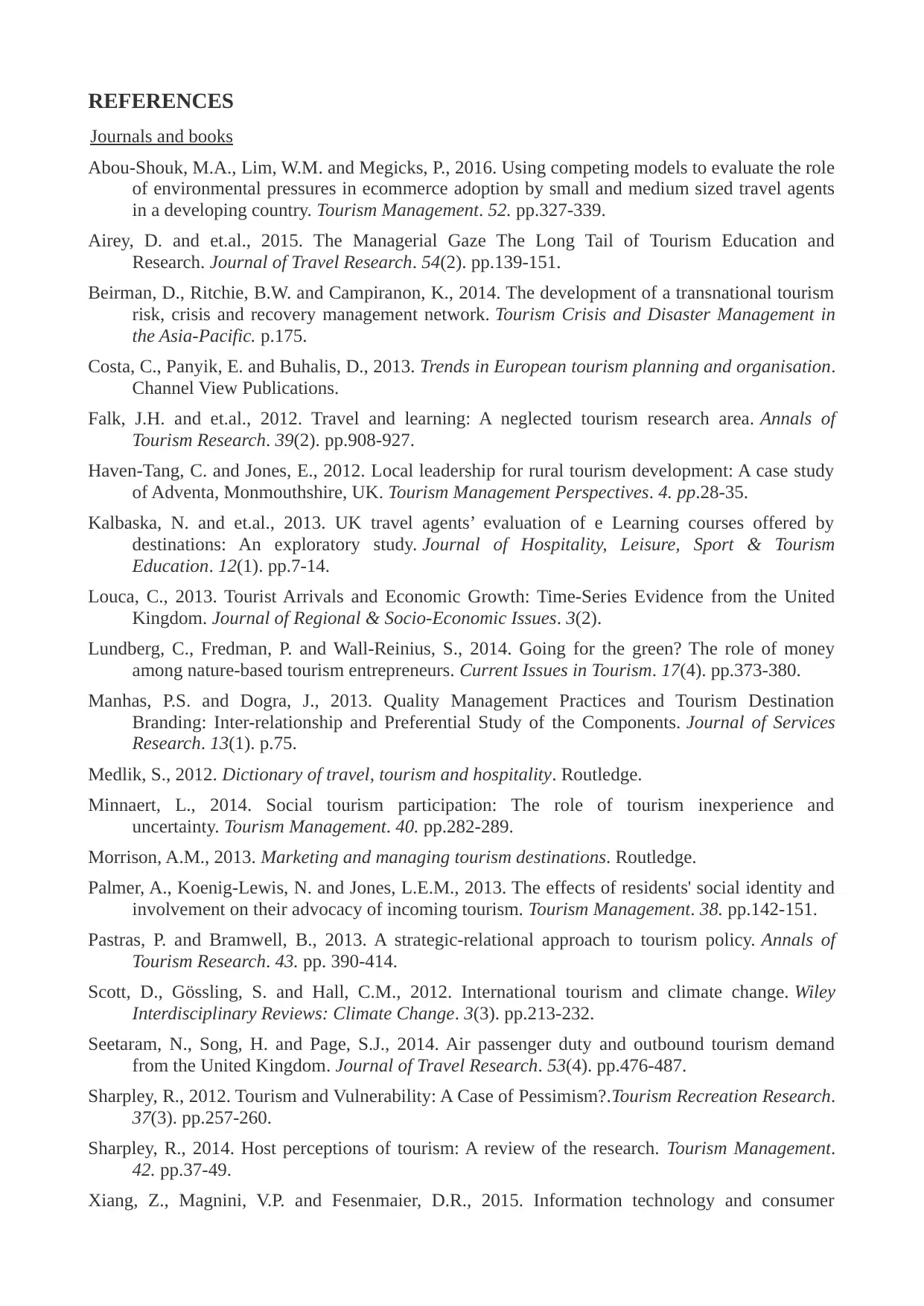
REFERENCES
Journals and books
Abou-Shouk, M.A., Lim, W.M. and Megicks, P., 2016. Using competing models to evaluate the role
of environmental pressures in ecommerce adoption by small and medium sized travel agents
in a developing country. Tourism Management. 52. pp.327-339.
Airey, D. and et.al., 2015. The Managerial Gaze The Long Tail of Tourism Education and
Research. Journal of Travel Research. 54(2). pp.139-151.
Beirman, D., Ritchie, B.W. and Campiranon, K., 2014. The development of a transnational tourism
risk, crisis and recovery management network. Tourism Crisis and Disaster Management in
the Asia-Pacific. p.175.
Costa, C., Panyik, E. and Buhalis, D., 2013. Trends in European tourism planning and organisation.
Channel View Publications.
Falk, J.H. and et.al., 2012. Travel and learning: A neglected tourism research area. Annals of
Tourism Research. 39(2). pp.908-927.
Haven‐Tang, C. and Jones, E., 2012. Local leadership for rural tourism development: A case study
of Adventa, Monmouthshire, UK. Tourism Management Perspectives. 4. pp.28-35.
Kalbaska, N. and et.al., 2013. UK travel agents’ evaluation of e Learning courses offered by
destinations: An exploratory study. Journal of Hospitality, Leisure, Sport & Tourism
Education. 12(1). pp.7-14.
Louca, C., 2013. Tourist Arrivals and Economic Growth: Time-Series Evidence from the United
Kingdom. Journal of Regional & Socio-Economic Issues. 3(2).
Lundberg, C., Fredman, P. and Wall-Reinius, S., 2014. Going for the green? The role of money
among nature-based tourism entrepreneurs. Current Issues in Tourism. 17(4). pp.373-380.
Manhas, P.S. and Dogra, J., 2013. Quality Management Practices and Tourism Destination
Branding: Inter-relationship and Preferential Study of the Components. Journal of Services
Research. 13(1). p.75.
Medlik, S., 2012. Dictionary of travel, tourism and hospitality. Routledge.
Minnaert, L., 2014. Social tourism participation: The role of tourism inexperience and
uncertainty. Tourism Management. 40. pp.282-289.
Morrison, A.M., 2013. Marketing and managing tourism destinations. Routledge.
Palmer, A., Koenig-Lewis, N. and Jones, L.E.M., 2013. The effects of residents' social identity and
involvement on their advocacy of incoming tourism. Tourism Management. 38. pp.142-151.
Pastras, P. and Bramwell, B., 2013. A strategic-relational approach to tourism policy. Annals of
Tourism Research. 43. pp. 390-414.
Scott, D., Gössling, S. and Hall, C.M., 2012. International tourism and climate change. Wiley
Interdisciplinary Reviews: Climate Change. 3(3). pp.213-232.
Seetaram, N., Song, H. and Page, S.J., 2014. Air passenger duty and outbound tourism demand
from the United Kingdom. Journal of Travel Research. 53(4). pp.476-487.
Sharpley, R., 2012. Tourism and Vulnerability: A Case of Pessimism?.Tourism Recreation Research.
37(3). pp.257-260.
Sharpley, R., 2014. Host perceptions of tourism: A review of the research. Tourism Management.
42. pp.37-49.
Xiang, Z., Magnini, V.P. and Fesenmaier, D.R., 2015. Information technology and consumer
Journals and books
Abou-Shouk, M.A., Lim, W.M. and Megicks, P., 2016. Using competing models to evaluate the role
of environmental pressures in ecommerce adoption by small and medium sized travel agents
in a developing country. Tourism Management. 52. pp.327-339.
Airey, D. and et.al., 2015. The Managerial Gaze The Long Tail of Tourism Education and
Research. Journal of Travel Research. 54(2). pp.139-151.
Beirman, D., Ritchie, B.W. and Campiranon, K., 2014. The development of a transnational tourism
risk, crisis and recovery management network. Tourism Crisis and Disaster Management in
the Asia-Pacific. p.175.
Costa, C., Panyik, E. and Buhalis, D., 2013. Trends in European tourism planning and organisation.
Channel View Publications.
Falk, J.H. and et.al., 2012. Travel and learning: A neglected tourism research area. Annals of
Tourism Research. 39(2). pp.908-927.
Haven‐Tang, C. and Jones, E., 2012. Local leadership for rural tourism development: A case study
of Adventa, Monmouthshire, UK. Tourism Management Perspectives. 4. pp.28-35.
Kalbaska, N. and et.al., 2013. UK travel agents’ evaluation of e Learning courses offered by
destinations: An exploratory study. Journal of Hospitality, Leisure, Sport & Tourism
Education. 12(1). pp.7-14.
Louca, C., 2013. Tourist Arrivals and Economic Growth: Time-Series Evidence from the United
Kingdom. Journal of Regional & Socio-Economic Issues. 3(2).
Lundberg, C., Fredman, P. and Wall-Reinius, S., 2014. Going for the green? The role of money
among nature-based tourism entrepreneurs. Current Issues in Tourism. 17(4). pp.373-380.
Manhas, P.S. and Dogra, J., 2013. Quality Management Practices and Tourism Destination
Branding: Inter-relationship and Preferential Study of the Components. Journal of Services
Research. 13(1). p.75.
Medlik, S., 2012. Dictionary of travel, tourism and hospitality. Routledge.
Minnaert, L., 2014. Social tourism participation: The role of tourism inexperience and
uncertainty. Tourism Management. 40. pp.282-289.
Morrison, A.M., 2013. Marketing and managing tourism destinations. Routledge.
Palmer, A., Koenig-Lewis, N. and Jones, L.E.M., 2013. The effects of residents' social identity and
involvement on their advocacy of incoming tourism. Tourism Management. 38. pp.142-151.
Pastras, P. and Bramwell, B., 2013. A strategic-relational approach to tourism policy. Annals of
Tourism Research. 43. pp. 390-414.
Scott, D., Gössling, S. and Hall, C.M., 2012. International tourism and climate change. Wiley
Interdisciplinary Reviews: Climate Change. 3(3). pp.213-232.
Seetaram, N., Song, H. and Page, S.J., 2014. Air passenger duty and outbound tourism demand
from the United Kingdom. Journal of Travel Research. 53(4). pp.476-487.
Sharpley, R., 2012. Tourism and Vulnerability: A Case of Pessimism?.Tourism Recreation Research.
37(3). pp.257-260.
Sharpley, R., 2014. Host perceptions of tourism: A review of the research. Tourism Management.
42. pp.37-49.
Xiang, Z., Magnini, V.P. and Fesenmaier, D.R., 2015. Information technology and consumer
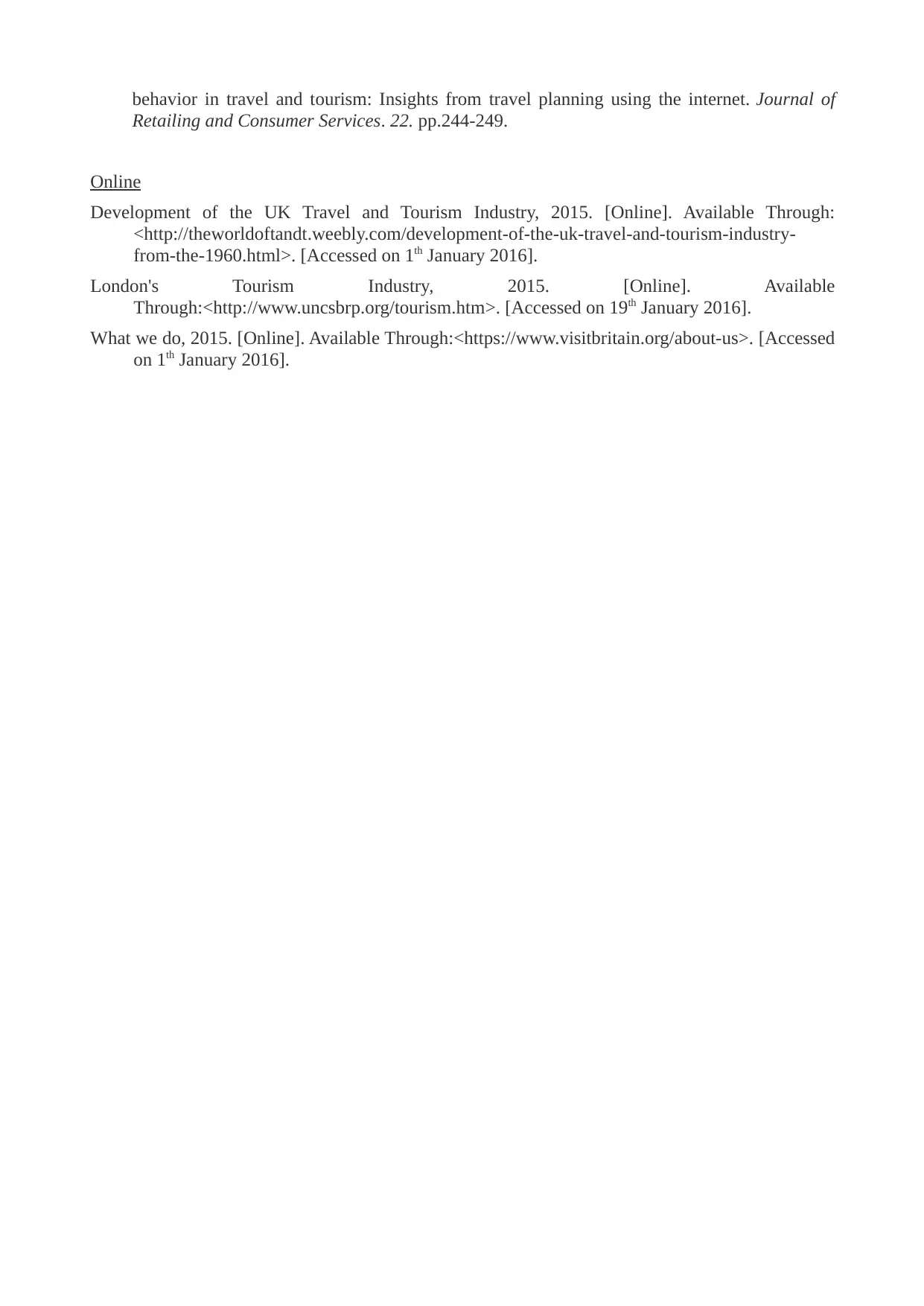
behavior in travel and tourism: Insights from travel planning using the internet. Journal of
Retailing and Consumer Services. 22. pp.244-249.
Online
Development of the UK Travel and Tourism Industry, 2015. [Online]. Available Through:
<http://theworldoftandt.weebly.com/development-of-the-uk-travel-and-tourism-industry-
from-the-1960.html>. [Accessed on 1th January 2016].
London's Tourism Industry, 2015. [Online]. Available
Through:<http://www.uncsbrp.org/tourism.htm>. [Accessed on 19th January 2016].
What we do, 2015. [Online]. Available Through:<https://www.visitbritain.org/about-us>. [Accessed
on 1th January 2016].
Retailing and Consumer Services. 22. pp.244-249.
Online
Development of the UK Travel and Tourism Industry, 2015. [Online]. Available Through:
<http://theworldoftandt.weebly.com/development-of-the-uk-travel-and-tourism-industry-
from-the-1960.html>. [Accessed on 1th January 2016].
London's Tourism Industry, 2015. [Online]. Available
Through:<http://www.uncsbrp.org/tourism.htm>. [Accessed on 19th January 2016].
What we do, 2015. [Online]. Available Through:<https://www.visitbritain.org/about-us>. [Accessed
on 1th January 2016].
⊘ This is a preview!⊘
Do you want full access?
Subscribe today to unlock all pages.

Trusted by 1+ million students worldwide
1 out of 12
Related Documents
Your All-in-One AI-Powered Toolkit for Academic Success.
+13062052269
info@desklib.com
Available 24*7 on WhatsApp / Email
![[object Object]](/_next/static/media/star-bottom.7253800d.svg)
Unlock your academic potential
Copyright © 2020–2025 A2Z Services. All Rights Reserved. Developed and managed by ZUCOL.





